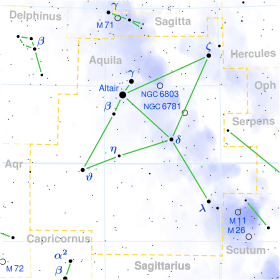V Aquilae
V Aquilae (V Aql) is a carbon star and semiregular variable star in the constellation Aquila. It has an apparent magnitude which varies between 6.6 and 8.4 and is located around 400 parsecs (1,300 ly) away.
| Observation data Epoch J2000 Equinox J2000 | |
|---|---|
| Constellation | Aquila |
| Right ascension | 19h 04m 24.155s[1] |
| Declination | −05° 41′ 05.44″[1] |
| Apparent magnitude (V) | 6.6 - 8.4[2] |
| Characteristics | |
| Spectral type | C5,4-C6,4(N6)[2] |
| B−V color index | +4.32[3] |
| Variable type | SRb[2] |
| Astrometry | |
| Radial velocity (Rv) | +37[4] km/s |
| Proper motion (μ) | RA: 6.243±0.407[5] mas/yr Dec.: −1.379±0.318[5] mas/yr |
| Parallax (π) | 2.4779 ± 0.2320[5] mas |
| Distance | 1,300 ± 100 ly (400 ± 40 pc) |
| Absolute magnitude (MV) | −5.19[6] |
| Details | |
| Luminosity | 6,500[7] L☉ |
| Temperature | 2,800[7] K |
| Metallicity [Fe/H] | 0.10[8] dex |
| Other designations | |
| Database references | |
| SIMBAD | data |
V Aquilae is a type of star with a spectrum that is dominated by strong absorption lines of the molecules C2 and CN, hence known as carbon stars. The enhanced levels of carbon in the atmosphere originate recently nucleosynthesized material that has been dredged up to the surface by deep convection during temporary shell burning events known as thermal pulses. Published spectral types for the star vary somewhat from C54 to C64, or N6 under an older system of classification.[2][10] The subscript 4 refers to the strength of the molecular carbon bands in the spectrum, an indicator of the relatively abundances of carbon in the atmosphere.
V Aquilae is a variable star of type SRb.[8] It has a published period of 400 days, but other periods are found including 350 days and 2,270 days.[11]
References
- van Leeuwen, F. (2007). "Validation of the new Hipparcos reduction". Astronomy and Astrophysics. 474 (2): 653–664. arXiv:0708.1752. Bibcode:2007A&A...474..653V. doi:10.1051/0004-6361:20078357.Vizier catalog entry
- Samus, N. N.; Durlevich, O. V.; et al. (2009). "VizieR Online Data Catalog: General Catalogue of Variable Stars (Samus+ 2007-2013)". VizieR On-line Data Catalog: B/gcvs. Originally Published in: 2009yCat....102025S. 1: B/gcvs. Bibcode:2009yCat....102025S.
- Nicolet, B. (October 1978). "Catalogue of homogeneous data in the UBV photoelectric photometric system". Astronomy & Astrophysics Supplement Series. 34: 1–49. Bibcode:1978A&AS...34....1N.
- Wilson, Ralph Elmer (1953). "General Catalogue of Stellar Radial Velocities". Carnegie Institute Washington D.c. Publication: 0. Bibcode:1953GCRV..C......0W.
- Brown, A. G. A.; et al. (Gaia collaboration) (August 2018). "Gaia Data Release 2: Summary of the contents and survey properties". Astronomy & Astrophysics. 616. A1. arXiv:1804.09365. Bibcode:2018A&A...616A...1G. doi:10.1051/0004-6361/201833051. Gaia DR2 record for this source at VizieR.
- Guandalini, R; Cristallo, S (2013). "Luminosities of carbon-rich asymptotic giant branch stars in the Milky Way". Astronomy & Astrophysics. 555: A120. arXiv:1305.4203. Bibcode:2013A&A...555A.120G. doi:10.1051/0004-6361/201321225.
- Schöier, F. L; Ramstedt, S; Olofsson, H; Lindqvist, M; Bieging, J. H; Marvel, K. B (2013). "The abundance of HCN in circumstellar envelopes of AGB stars of different chemical type". Astronomy & Astrophysics. 550: A78. arXiv:1301.2129. Bibcode:2013A&A...550A..78S. doi:10.1051/0004-6361/201220400.
- Lambert, David L.; Gustafsson, Bengt; Eriksson, Kjell; Hinkle, Kenneth H. (October 1986). "The chemical composition of carbon stars. I - Carbon, nitrogen, and oxygen in 30 cool carbon stars in the Galactic disk". Astrophysical Journal Supplement Series. 62: 373–425. Bibcode:1986ApJS...62..373L. doi:10.1086/191145.
- "V* V Aql -- Semi-regular pulsating Star". SIMBAD. Centre de Données astronomiques de Strasbourg. Retrieved 2010-10-06.
- Skiff, B. A. (2014). "VizieR Online Data Catalog: Catalogue of Stellar Spectral Classifications (Skiff, 2009-2016)". VizieR On-line Data Catalog: B/mk. Originally Published in: Lowell Observatory (October 2014). 1: B/mk. Bibcode:2014yCat....1.2023S.
- Olivier, E. A; Wood, P. R (2003). "On the Origin of Long Secondary Periods in Semiregular Variables". The Astrophysical Journal. 584 (2): 1035–1041. Bibcode:2003ApJ...584.1035O. doi:10.1086/345715.
